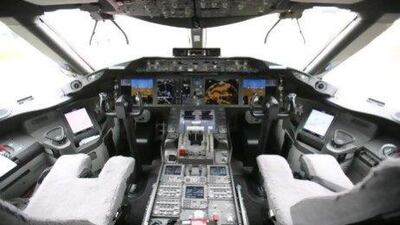A Boeing, the world's largest aerospace and defence company, is scheduled to post strong fourth-quarter results today. But investors and media participating in the day's conference calls are expected instead to focus attention on the troubled 787 Dreamliner.
Questions are mounting about the delays in delivering the aircraft. Boeing is three years behind schedule for its first delivery to Japan's ANA airline, much to the consternation of airlines around the world, including customers based in the Middle East.
An eighth delay was announced last week, pushing the first delivery back to the third quarter of this year, meaning an additional spell of deferred revenues for Boeing as well as financial penalties for missing targets that it promised customers. Worse yet, an investigative report from the aerospace journal Flightglobal reports Boeing may have sold hundreds of the aircraft at prices so low it may not reap any profits from early deliveries.
"Boeing wanted a category killer, a way out of the desperate price competition that hobbles the jetliner duopoly [with Airbus]," says Richard Aboulafia, the vice president of analysis at the Teal Group, which provides consulting services in the aerospace industry. But over the past decade, he says, "Boeing disastrously executed on a brilliant vision".
The 787 Dreamliner is the fastest-selling aeroplane for the world's largest and most successful aerospace company, which dates back to 1916 and its Model 1, a wooden, biplane seaplane crafted on the shores of Lake Union in Seattle, Washington.
Launched in January 2003 as the "7E7", as the 787 Dreamliner was then called, Boeing's new mid-size twinjet came after a cancelled project to build a superfast, "sonic cruiser" that met a tepid response from airlines because of fears of high operating costs.
The Dreamliner, however, promised not increased speed, but lower costs of about a fifth compared with the similarly sized, and older Boeing 767.
These efficiencies helped attract significant orders from the Middle East including Etihad Airways, Qatar Airways, Royal Jordanian, the Government of Iraq, Dubai's DAE, the aviation lease and finance company Alafco, and the aircraft leasing company LCAL.
The new plane's concept hinged on several new elements: it assumed that airlines would open up more long-haul direct flights, which would rely on aircraft such as the Dreamliner. It also assumed that lightweight, futuristic composite materials were ready to replace aluminium.
Another key point was that Boeing gambled that the globalised economy could shoulder an enlarged share of the complex aircraft supply chain, giving the company a plane it could simply snap together for final assembly in the US.
While analysts said Boeing's commercial aircraft unit was right to target the mid-sized aircraft category, the unit's chief executive Jim Albaugh conceded that other assumptions had not panned out as expected.
"Some of the technology was not as mature as it should have been and we put a global supply chain together without thinking through some of the consequences," he said last week at a conference in Saudi Arabia. "When you put immature technology in your supply chain and don't supply adequate oversight, you have issues and that [is] what we had."
In fact, Saj Ahmad, an analyst and blogger with FBE Aerospace based in London, said uncertainties over Boeing's industrial partners remain the biggest challenge on the programme. Some Dreamliner 787 suppliers are physically unable to increase their production rate beyond seven shipments a month, despite Boeing's plans for a higher rate of producing 10 planes during a similar period, he says.
Likewise composites, says Mr Aboulafia, "sounded brilliant" and still offer benefits for this class of aircraft. "But they bring new complications to manufacturing and aircraft certification and will take much longer to mature than assumed," he says.
Already, the delays have benefited Airbus and its older mid-sized aeroplane, the A330. "Not wishing to gloat in terms of delays to the competition, we have sold close to 700 A330s since the launch of the 787," says Peter Barnes, the customer marketing director at Airbus Middle East.
But with its eighth and latest delay, which came after a fire on one of the test planes in November, "the 787 finally looks like it will enter service when Boeing says it will", Mr Ahmad says.
That will finally allow Boeing to bring in revenues from its Dreamliner programme. List price for the 787-8, the first variant of several that Boeing is focusing on, was US$185.2 million (Dh680.2m), as of last month.
However, according to an investigative report by Jon Ostrower, an aerospace journalist and blogger at Flightglobal, Boeing will earn far less on hundreds of the planes after cut-rate selling tactics designed to take business away from Airbus.
Between 2004 and 2006, prices for the Dreamliner airframe, not including engines, in-flight entertainment and other customised equipment, averaged just below $76m, Mr Ostrower reported after a lengthy investigation into the plane's costs.
"Cost overruns, penalty payments and supply chain changes adopted in the last two years will force Boeing to achieve unprecedented cost-savings for the widebody to turn a profit even after delivering the current 846-aircraft backlog," he concludes.
"There remains great risk and opportunity to ensure the 787 - the company's fastest-selling jetliner - becomes the cash cow Boeing hopes it will become."
With that in mind, it may be no surprise that James McNerney, the chief executive of Boeing, and his chief financial officer, James Bell, will have their hands full later today.

